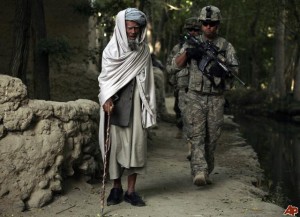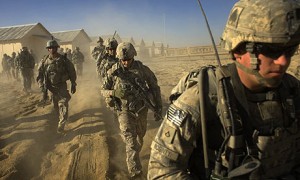Saturday
May222010
Afghanistan and Beyond: The Wicked Ideology of Counter-Insurgency (Mull)
 Saturday, May 22, 2010 at 9:39
Saturday, May 22, 2010 at 9:39  EA correspondent Josh Mull is the Afghanistan Blogging Fellow for The Seminal and Brave New Foundation. He also writes for Rethink Afghanistan:
EA correspondent Josh Mull is the Afghanistan Blogging Fellow for The Seminal and Brave New Foundation. He also writes for Rethink Afghanistan:There's a lot of hate speech floating around out there. You're used to it by now. The President is a black Muslim Nazi, lesbians-gays-bisexuals-transgenders destroy families, immigrants are disease-ridden criminals.
It's not just that these lies are offensive, though, is it? It's that they hint at something darker, more wicked underneath. The argument isn't that immigrants have diseases, so let's try to help them. It's that they have diseases, so they're filthy and must be hunted down and annihilated.
Afghanistan & Pakistan Analysis: Obama on a Road to Ruin? (Englehardt)
The folks who spread this hate speech are not lying out of altruism or compassion, they're lying as an expression of the dangerous, sociopathic capacities they possess. We know this from our foreign policy as well. It's not just the overt anti-semitism of terrorist videos that doubles you over, it's the psychotic undercurrent of suicide bombings that keeps you awake.
I thought about this when I read Steve Hynd's "COIN is like Soviet Communism?", where he exposes counterinsurgency not as a strategy but an ideology. He's right, but it's not just that counterinsurgency is a demented ideology, that it propagates vicious lies like obliterating a houseful of Afghan civilians is "protecting the population."
It's that COIN is a symptom of an idea more primeval and dangerous: violence is the solution. The fundamental idea behind counterinsurgency is that war is the right tool for the job. It may look different and sound different, but it's still war, still violently brutalizing a population --- us and them --- for isolated and selfish political ends.
Much like the hate speech in our political discourse, you only need to scratch the surface of this ideology to see the fascist and criminal tendencies underneath. Here's Ann Marlowe writing in World Affairs:
More and more, I suspect that it’s the brutality that works, not the COIN. It’s moving hundreds of thousands of people across a country, or shooting all the men in a village as a reprisal for terrorism, or taking hostages, or doing extra-judicial kidnappings. Of course, the brutality would work without the COIN, too. Brutality works. But that’s not who we are.
Yes, you really just read that. The problem with our strategy is that it doesn't have enough ethnic cleansing. That's what it means when you shoot all the men in a village --- you wipe them out. I'll let you take a wild guess what happens to the women.
We should just skip all that drivel about development and go for more extra-judicial kidnappings. Because "brutality works". Massive displacements, that' s been awesome for the Israelis, right? Both the countries of Israel and Palestine are peaceful and happy, all thanks to the Nakba.
But the reason we're not using this successful strategy of brutality in Afghanistan is your fault. It's because you're a pillow-biting westerner. Marlowe continues:
COIN makes sense intellectually, especially in the pellucid prose of David Galula, who wrote better in English than Roger Trinquier in French. Part of the reason it makes sense is that COIN is congruent with our culture’s bias toward a perspectival view of reality. As General McChrystal keeps saying, counterinsurgency is a matter of perception.
Right, that little voice inside you that says wiping out entire populations of human beings isn't a good thing, that's just your "cultural bias." You just want to believe in a "perspectival view of reality". Silly wimp, too many blue jeans and diet sodas for you! Big, tough Ann Marlowe knows the truth. War crimes are great:
In Algeria, the French were able to forcibly resettle villagers, build miles-long walls to close Algeria’s borders, and, of course, torture terrorists, or simply toss them out of planes if they wouldn’t talk. And that war didn’t end well. In Malaya, the British achieved success, but also with forcible resettlement of inconveniently located villagers and many other heavy-handed measures that would be completely beyond the pale today. Also, in both of these countries, the counterinsurgents essentially were the government, with long involvement on the ground.
Speaking of which, the Sri Lankan government seems to have succeeded against the Tamil Tigers, but if we could use their measures we would win in Afghanistan too. When the US government fought insurgents in the South after the Civil War, it declared martial law and shot enemy suspects on sight.
Aren't we all pining for the good old days of Blood and Iron, when we had martial law imposed on the South? Probably no innocents --- only the guilty --- were shot on sight, and even if they were, who gives a damn, we won! That sure was a shining moment of military strategy and of American values.
Now if only we could just replicate the tactics of the Sri Lankan government, "we would win in Afghanistan". (Yep, she said "win," like maybe she thinks there's some kind of prize at the end.) And what did the government of Sri Lanka do to win? Well they just shelled all the Tamil villages. They displaced them into giant, hellscape refugee camps, and then obliterated them with artillery, air strikes, executions, and massacres.
Remember the Superdome during Katrina? Yeah, like that, only add carpet bombing. Murder everyone in their own filth, that's how to win in Afghanistan. Feel good?
Excuse my language, but this is some heavy, disturbing shit. This is sickness, rationalizing crimes against humanity. It's past stealing bread to feed to your family and to the point of justifying genocide. Completely absent are any Enlightenment achievements like rule of law and the value of human life.
But this is exactly what we should expect when we have the obvious, blaring warning signs of COIN. It starts with a little bit of violence, a little bit of war, but it starts expanding (devolving?). We need 30,000 more troops. We need to expand our extra-judicial killings and kidnappings, more drone strikes and more night raids. Is it any surprise that Ann Marlowe says skip the development and "the talking part", and jumps straight to reptilian sins like displacement and ethnic cleansing?
This is not some loose, rhetorical "slippery slope" argument, this is actually happening. Ann Marlowe published this on Thursday. Thursday, 20 May 2010, almost a decade after the United States of America invaded and occupied Afghanistan, Ann Marlowe said our soldiers should commit war crimes against humanity to win. And she's not just dredging up ancient history from the Civil War, Sri Lanka was ethnically cleansed last year. The annihilation of the Tamil people happened right before our eyes, and we're so poisoned with war that our only reaction was "we need more of that!"
This is why we need to completely remove the military from Afghanistan, bring every last troop home. And more importantly, this is why need to avoid getting sucked into stupid media games. This is why we need to take such a hard line against our politicians. These ideas and debates have real consequences.
Democrats want to look tough on national security, and now 1,000 Americans are dead. We want a fine-tuned, population-friendly counterinsurgency strategy in Afghanistan, and now thousands of Afghans and Pakistanis are dead. We so believe in this concept of "victory" in Afghanistan that we have honest, thoughtful discussions on whether or not crimes against humanity are a good tactic.
Bring the troops home. We have better solutions to the problem, and we have other issues to deal with. Join us on Rethink Afghanistan’s Facebook page and collaborate with the tens of thousands of others around the country working to bring this war to an end.


